|
|
Young Vermonters Share Their Vision for the Future with Us |
|
Dear Fellow Vermonter,
The future of our state and country rests with our young people. That is why I have, for the last 12 years, conducted an essay contest for Vermont high school students on the “State of the Union.” I want the young citizens of Vermont to be thinking about the major issues facing our country, what the solutions might be and what each of them would say if they were the President of the United States giving a State of the Union address to the nation.
This year, we had a record number, 409 students from 38 Vermont high schools, submit essays on every conceivable issue. I want to thank all of them for their participation. An independent group of Vermont teachers, outside of my office, helped judge these essays and selected the ten best. I recently had the opportunity of engaging in a round table discussion with the finalists at the State House. I don’t know about them, but I had a lot of fun.
Below are the top 3 essays. I hope you take a moment to read them.
To read the essays of all of the finalists, click here. To watch the full event, click here.
Sincerely,

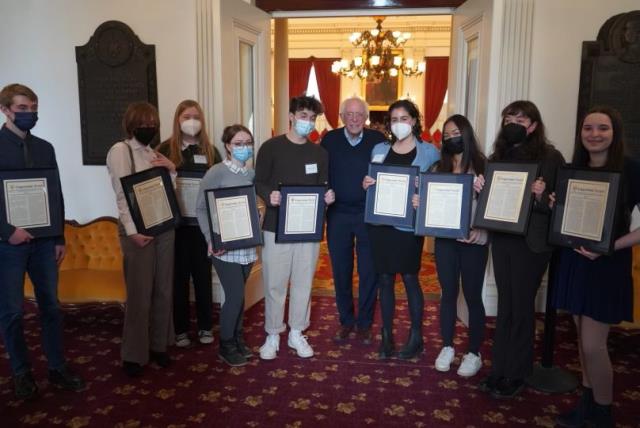
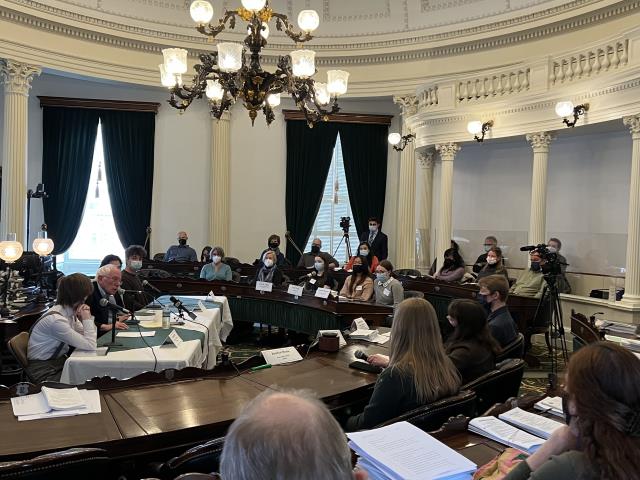
|
|
1st Place: Sasha Lann
Sophomore, Brattleboro Union High School |
|
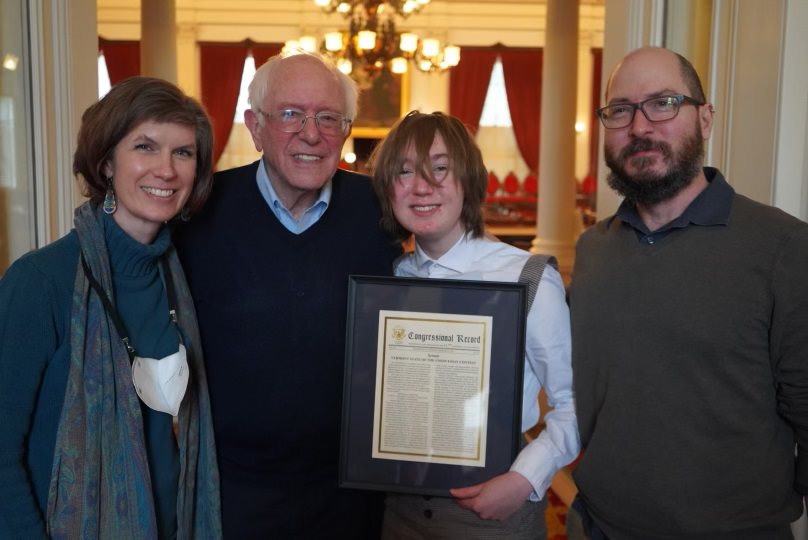
Citizens' rights to vote may be the most fundamental aspect of our democracy, but there is a growing effort to limit it. Increasing voter suppression and restrictive voting laws is an issue that must be addressed, as it has grown from a gradual build to a rush of constant new legislation that could do permanent damage if ignored. Voter suppression is one of the United States' biggest threats to democracy, and the way to address it may be to enact legislation that ensures all Americans have equal access to voting and have their votes counted.
Recently, the United States has seen a massive uptick in legislation restricting voting in large sections of the country. In 2021 alone, 99 bills were introduced in 31 states to restrict voting. 34 were passed into law. The laws strengthen ID requirements, limit drop boxes and mail voting, increase opportunities for voter purges, and introduce criminal penalties for election officers who help voters return mail ballots. These laws excessively target BIPOC communities. Young voters are also made vulnerable by this legislation. This attack on our voting system, though disproportionately affecting communities of color, will harm the entire country and make us vulnerable to authoritarianism and the collapse of our democracy altogether.
Enacting effective voting rights legislation can be a lengthy and difficult process. There are already bills in progress that have passed the House, but are being blocked by Republicans via the filibuster. As soon as the filibuster can be changed, we can continue to make progress. In the meantime, the best solution may be to do what we can to prevent lawmakers from signing more restrictive legislation into law. Part of this solution relies on companies ending support and campaign contributions for lawmakers responsible for this legislation. Companies and businesses could play an essential role in standing up to these efforts. However, community and business support will not be enough to prevent suppressive legislation for long.
There are several solutions that could stop the onslaught of voter restriction laws long term, starting with federal legislation to protect voting rights and remove obstacles for those facing difficulty casting votes. There should be laws to enforce automatic registration, restore voter rights for former prisoners, and increase resources for election boards to ensure security. Election Day could also be made a holiday so citizens have free time to vote, and each state should set up independent redistricting commissions to avoid gerrymandering. If used together, these methods will greatly improve access to voting.
Voter suppression and restrictive voting laws are threatening the integrity of our democracy, and we can counteract them by passing legislation that protects citizens' say in the course of the country through their votes. If nothing is done, we may see the fall of our democracy as we know it. These are the steps needed to be taken to preserve this cornerstone of our country.
|
|
2nd Place: Eva Frazier
Senior, Champlain Valley Union High School |
|
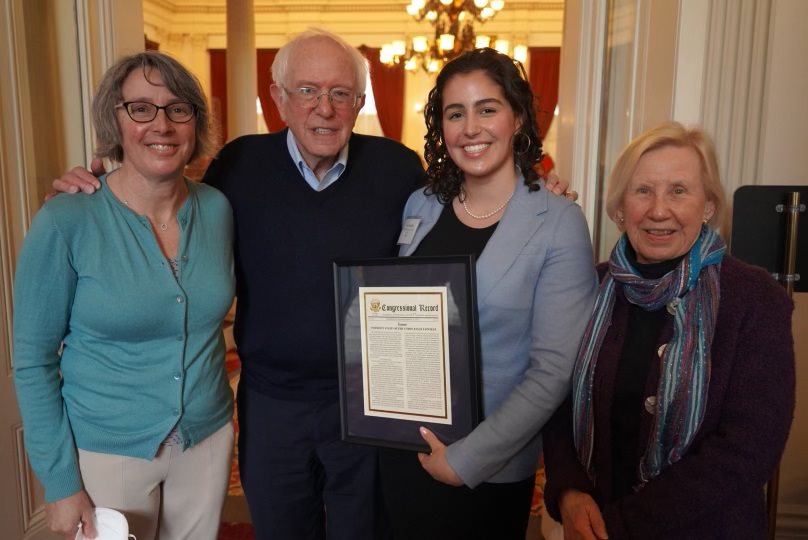
In the past few months, millions of people have lost rights over their bodies, their health, and their futures. As countless states across the country move to almost totally limit abortion, I fear for all people who may become pregnant in these affected areas. I fear for those without money to travel to obtain a safe abortion, for those expectant mothers experiencing a medical condition forced to choose between their life or their child's, and for the youth without proper education, suddenly finding themselves with no choice over their lives.
Two things happen when politicians ban or block abortions: unsafe abortions or children being born to people who can't take care of them. Many will die, and it is almost always poor, BIPOC, and marginalized people. The state of reproductive rights in this country is an aggressive violation of human rights.
To combat the alarming issues affecting reproductive rights locally, nationally, and internationally, I would propose a three-tiered approach to provide reproductive services to all who need them. First, at the state level, Vermont needs to amend our state Constitution, and protect the right to abortion, without barrier, forever. If Vermont state legislators succeed in passing this amendment, currently known as Prop 5, Vermont will become the first state to protect the right to reproductive health care access. In addition to legally protecting the right to abortion, Vermont state legislators must increase the budget for health care centers that perform abortions.
Nationally, Congress must pass two pieces of legislation. First, Congress must repeal the Hyde Amendment. As the ACLU states, "Passed by Congress in 1976, the Hyde Amendment excludes abortion from the comprehensive health care services provided to low-income people by the Federal Government through Medicaid." Low-income people are the least likely to have transportation and funds to obtain an abortion, and the Hyde amendment keeps low income people from having equal access to determine their futures.
Reproductive rights are not only at stake nationally, but internationally. Currently, the U.S. will not fund any international health care centers that provide abortions, which often then prohibits them from providing lifesaving treatments for malaria, HIV/AIDS, and other medical care. This draconian policy, known as the Global Gag Rule, was first introduced by President Reagan, and recently reinstated by President Trump. U.S. congressional representatives have a duty to pass legislation, known as the Global HER Act, that would overturn the Global Gag Rule, and cement the U.S. as a country that provides necessary foreign aid, instead of risking millions of lives.
As people turn to illegal abortions, it is crucial that lawmakers work to protect their citizens by passing federal law and upholding the International Human Rights declaration, giving humans freedom over their bodies and health care choices.
|
|
3rd Place: Samuel Leggett
Junior, Woodstock Union High School |
|
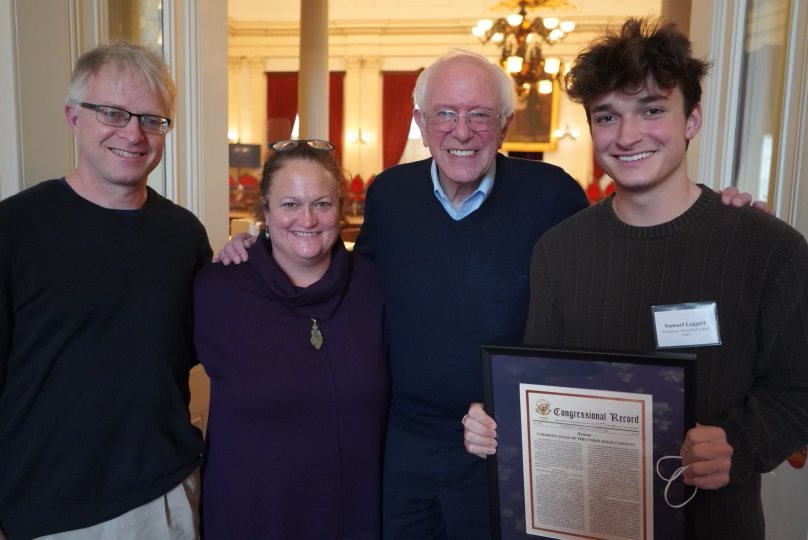
Throughout history, America has been plagued with the complex issue of food insecurity. Moreover, the children of our nation – the ambassadors to our future – seem to experience it more severely. According to Feeding America, one in every eight adults currently faces hunger, and the same can be said for one in six children. Furthermore, hunger in our youth has only festered with the effects of the Covid-19 pandemic. Compared to 10 million previously, the number of food-insecure children in America has increased to approximately 12 million. Notwithstanding our nation's immense prosperity and value for education, our students experience inaccessibility to affordable, nutritious food, and are seldom provided with the assistance they need.
Though the discussion of universal free meals has long existed, the pandemic proved to be the catalyst for its execution. Through action on behalf of the U.S. Department of Agriculture, our government will provide free breakfast and lunch to schools nationwide throughout the 2021-2022 school year. Students now have the opportunity to be created equal in their education and wellbeing. Recent studies from the Robert Wood Johnson Foundation have concluded that the initiative has even improved both student behavior and performance. Though abundant are the benefits of this Covid-mitigation strategy, the implementation of universal school meals is still seen as a temporary measure. Even long after these challenging times, however, the pandemic's repercussions will persist, if not worsen, if not addressed. Though they may initially seem like a significant financial hurdle, universal school meals are a progressive, bipartisan, and necessary first effort in resolving the issue of food insecurity.
One significant advantage to implementing universal free meals is that it would permanently eliminate the nation's preexisting free and reduced lunch system – an inequitable, stigma-inducing program designed to assist students facing hunger. With strict eligibility requirements, free and reduced meals were rarely provided to all those who needed them, and the income-based aid system couldn't accurately account for criteria-meeting households that were nevertheless food insecure for other reasons. Additionally, applications for the program were not required, which excluded many more who potentially qualified, yet didn't apply. The program offered no way to adequately gauge whether or not one needed assistance.
Nonetheless, there remains one primary barrier to the support of universal free meals: their funding. Taxpayers fear they would wholly assume the burden of a potentially expensive feat. However, only 0.3 percent of the federal budget is currently reserved for child nutrition programs, and this cost is distributed nationwide among taxpayers. Evidently, reapportionment of the budget to increase this expenditure would neither reduce spending allocated to other departments nor increase local tax rates greatly.
We must allow ourselves to imagine an America where a free meal, despite the traditional adage, is indeed possible; an America that ensures our youth's prosperity, during and following times of crisis. We must consider the future, and pass sustainable, logical legislation; legislation providing every student with the baseline liberty of a satisfied stomach in their daily pursuit of knowledge.
|
|
How Can We Help?
My Vermont offices have experienced caseworkers on staff who help Vermonters navigate federal agencies every day. If you think my office can help, please do not hesitate to call 1-800-339-9834 or click here.
If you would like to share your thoughts on pending legislation, or if you have an idea that we could address through new legislation, click here.
Receiving this email as a forward? Click here to sign up for the Bernie Buzz. |
|
|
|
|
 
|
|